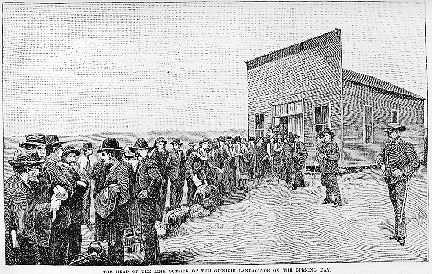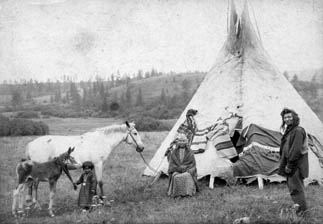
Westward migration made it more and more difficult for Congress to enforce treaty restrictions on white settlers. Tensions on the frontier eventually engulfed every western tribe into a war with the interlopers despite the hundreds of treaties of peace that had been negotiated in the previous half century.
The last treaty was
made with the Nez Perce and was broken just a few years later,
leading to the Nez Perce War.
A move to end
the treaty system was in full swing in the House of Representatives
by the late 1860s. Caleb H. Smith, commissioner of
Indian affairs, supported an official repudiation of treaties and
the imposition of an allotment program. Smith urged Congress
to declare Indians to be the dependent wards of the government and
to let his bureau be the primary authority over their land and
lives.

A Nez Perce family
There were
plenty of congressmen of the day who would have voted for such
legislation, but the end of treaty making came about as a pragmatic
solution to the jealousy of members of the U.S. House of
Representatives who resented the relationship between the president
and the U.S. Senate in the business of making and executing Indian
policy. They also felt that tribes should be dealt with in
general legislation rather than through treaties that were
protected by the supremacy clause of the U.S. Constitution, a
pre-condition that formally recognized tribes as semi-autonomous
governments bodies with independent powers. In order to
achieve the ends of Manifest Destiny, the American landscape needed
to be swept clear of the savages who still had a legal right to
self-rule.
Click here for more
The end of the
process was little more than a way of resolving petty jealousies
between the House and the Senate. Tiring of having to pay out
annuities to tribes who signed treaties ratified by the U.S.
Senate, the House demanded an end to the process through an
amendment it attached to the appropriations bill of 1871.
This action
brought an end to the second treaty era, but not to removals, which
would continue until the western tribes had been herded onto
reservations.
Related People
Related Events